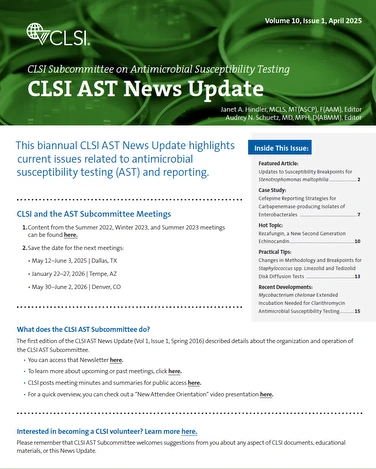You'll receive the latest updates on new standards, guidelines, and educational resources, as well as expert insights to help enhance your laboratory's performance and compliance.
Mycobacterium chelonae Extended Incubation Needed for Clarithromycin Antimicrobial Susceptibility Testing
Barbara A. Brown-Elliott, The University of Texas at Tyler Health Science Center, Tyler, TX Nikki M. Parrish, John Hopkins University School of Medicine, Baltimore, MD Nancy L. Wengenack, Mayo Clinic, Rochester, MN on behalf of the CLSI Mycobacterial AST Working Group

Barbara A. Brown-Elliott, The University of Texas at Tyler Health Science Center, Tyler, TX Nikki M. Parrish, John Hopkins University School of Medicine, Baltimore, MD Nancy L. Wengenack, Mayo Clinic, Rochester, MN on behalf of the CLSI Mycobacterial AST Working Group
CLSI AST News Update | Volume 10, Issue 1, April 2025
CLSI M24 provides a standard method for antimicrobial susceptibility testing (AST) of rapidly growing mycobacteria (RGM), including M. chelonae.1 Some RGM species, such as most M. abscessus subsp. abscessus and subsp. bolletii, but not subsp. massiliense, are known to possess a functional erythromycin methylase resistance (erm) gene that can confer inducible resistance to macrolides. As a result, CLSI M24 indicates that erm sequencing or extended incubation of clarithromycin phenotypic AST out to 14 days should be used to provide an indication of macrolide resistance due to the presence of this gene.1 At the time of publication of CLSI M24 in 2018, there was no evidence of an inducible erm gene in M. chelonae and therefore there was no recommendation in CLSI M24 to perform extended 14-day incubation of M. chelonae isolates.
However, in 2023, Brown-Elliott et. al., published an article in the Journal of Clinical Microbiology providing evidence that M. chelonae does possess a novel erm, erm(55), which can cause high-level inducible macrolide resistance in clinical isolates.2 Erm(55) has been found to be either putatively carried on a plasmid, chromosome, or transposon. While the chromosomal and transposon erm(55) is constitutive and detected after 3 days of incubation, the plasmid-borne erm(55) is inducible, requiring up to 14 days of incubation to detect resistance and this erm was detected in 3.8% of clinical isolates in this two-center study. As a result, extended incubation of M. chelonae isolates for 14 days for clarithromycin or sequencing of erm(55) is required to detect inducible macrolide resistance in this Mycobacterium species. CLSI M24 is under consideration for an update at this time and this information will be included in any update but in the meantime, laboratories should perform extended 14-day incubation of M. chelonae isolates, like that already performed for M. abscessus, in order to detect inducible macrolide resistance. The same 2023 study also provided evidence of erm(55) in other RGM species. Therefore, the recommendation for extended incubation or sequencing for erm(55) should also be strongly considered for all RGM or at least those isolates with a 3-4 day clarithromycin MIC of ≥ 0.5μg/mL. The mobility of plasmids and transposons with this erm(55) resistance mechanism is disturbing. Moreover, the potential for spread among genera as has been shown, creates more therapeutic challenges for these already difficult to treat diseases caused by nontuberculous mycobacteria (NTM).
References
- CLSI. Susceptibility Testing of Mycobacteria, Nocardia spp., and Other Aerobic Actinomycetes. 3rd ed. CLSI standard M24. Wayne, PA: Clinical and Laboratory Standards Institute; 2018.
- Brown-Elliott BA, Wallace RJ Jr, Wengenack NL, Workman SD, Cameron ADS, Bush G, Hughes MD, Melton S, Gonzalez- Ramirez B, Rodriguez E, Somayaji K, Klapperich C, Viers M, Bolaji AJ, Rempel E, Alexander DC. Emergence of Inducible Macrolide Resistance in Mycobacterium chelonae Due to Broad-Host-Range Plasmid and Chromosomal Variants of the Novel 23S rRNA Methylase Gene, erm(55). J Clin Microbiol. 2023 Jul 20;61(7):e0042823. doi: 10.1128/jcm.00428-23. Epub 2023 Jun 22. Erratum in: J Clin Microbiol. 2024 May 8;62(5):e0041524. doi: 10.1128/jcm.00415-24. PMID: 37347171; PMCID: PMC10358161.